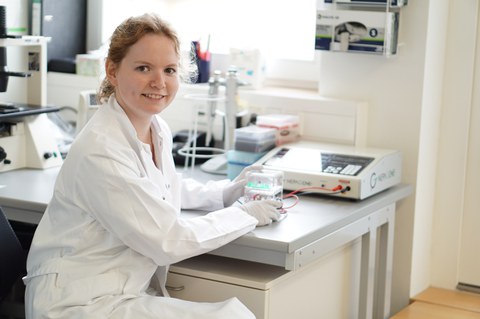Oct 06, 2025
Wilhelm Sander Foundation funds innovative research project on chromosomal instability in gastric cancer

Dr. Anne-Marlen Ada.
Chromosomal instability (CIN) can be observed in around half of all gastric cancers. This is a genetic alteration that is associated with particularly aggressive tumor behavior and can significantly impair the effectiveness of current therapies.
This is precisely where Dr. Anna-Marlen Ada 's research project, funded by the Wilhelm Sander Foundation, comes in. Her team in the Visceral, Thoracic, and Vascular Surgery research lab under the supervision of Prof. Daniel Stange is investigating how certain cancer mutations, also known as driver mutations, contribute to the development of CIN.
To this end, mutations are introduced into three-dimensional cell culture models (organoids) in a targeted manner using the CRISPR/Cas9 gene scissors. Various molecular biological methods such as PCR and fluorescence in situ hybridization are then used to analyse how chromosomal instability arises and develops. The researcher hopes to gain a better understanding of the underlying molecular processes through comprehensive gene and RNA analyses.
The project aims to identify new therapeutic approaches that act in a targeted manner against CIN and thus improve treatment options for patients with gastric cancer. This means fewer side effects, higher chances of recovery and more individualized, effective treatment strategies.
Background
The non-profit Wilhelm Sander Foundation was established in 1973 from the estate of the factory owner and entrepreneur Wilhelm Sander. In accordance with the last will and testament of its founder, its main aim is to support innovative cancer research.
